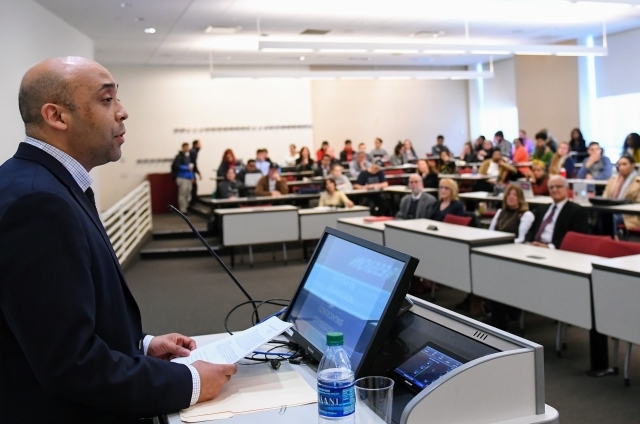
Suggesting that an insurrectionist stance of resistance is more effective than empathy when facing the challenges of oppression, Lee A. McBride III, Ph.D., 2018 Peter P. and Margaret A. D’Angelo Chair for the Humanities, St. John’s College of Liberal Arts and Sciences, delivered the 2018 D’Angelo Chair Lecture at St. John’s University on Monday, April 9.
“Dr. McBride’s steadfast pursuit of justice and social amelioration is an inspiration to both students and faculty,” said Jeffrey W. Fagen, Ph.D., Dean, St. John’s College of Liberal Arts and Sciences, and Professor of Psychology. “We in St. John’s College are delighted to have him serve as the 2018 D’Angelo Chair.”
Established in 2007, the Chair promotes excellence in teaching and scholarly exchange. Visiting professors appointed to the Chair are rotated among the various humanities departments within St. John’s College.
The lecture, “Empathy or Insurrection: Boldly Confronting Oppression,” drew more than 100 members of the St. John’s community to the D’Angelo Center on the Queens, NY, campus of the University. Dr. McBride also spoke on the topic at the Staten Island campus on March 22.
“Insurrectionist ethics is about standing up against injustice and oppression,” he declared in his lecture. “It is not about violent uprisings or mayhem.”
An Associate Professor of Philosophy at the College of Wooster, Dr. McBride’s work focuses on American philosophy, ethics, and political philosophy.
“We are told that justice and social amelioration will only be legitimately realized through empathy or love,” he said. “My hope is to persuade you that an insurrectionist stance of resistance is crucial to effectively confronting oppression.”
Often, anger is at the heart of such insurrection, and that anger, he contends, can be controlled and strategically used.
“If we conceive of anger as a virtue, a la Aristotle, then anger is not inherently retaliatory or vengeful,” he said. “It can help sustain the need to be vigilant against future wrongs and motivate victims to bind together in coalitions of resistance. It can also be instrumental in restoring self-confidence and self-worth in victimized or oppressed people.”
Dr. McBride challenged the notion that empathy and love are the only rational or effective ways to approach unjust or aggressive situations.
"One is expected to approach social justice with openness and compassion for the other—even for our oppressors,” he explained. “The alternative—insurrection—is typically depicted as irrational, foolish, and unwise.”
Using the American Revolution as an example, Dr. McBride explained that if people wish to fight injustice, they need to articulate and carry out some sort of strategy for combating social norms and structural institutions. “The American colonists, saddled with a British form of tyranny, engaged in a bloody revolution to win their freedom,” he said. “Should these rebels have waited with revolutionary patience?”
Among the many students attending the lecture was Alicia Berard, a sophomore from Fairfield County, CT, who expressed some hesitation in accepting the practice of insurrectionism. “As a Roman Catholic, there are some parts of the Bible that are in direct conflict with insurrectionism,” said the Philosophy major. “Despite that, I do feel that empathy and insurrection can coincide.”
Megan Solomon, a Philosophy major from Las Vegas, NV, also favored a more hybrid approach to the pursuit of social justice. “I don’t think that insurrection and empathy need to be purely dichotomous concepts,” she said. “There are ways you can use both to effect change. We’re often taught that we should be more patient and we should wait for change, but Dr. McBride did a remarkable job of explaining why that stance is often less productive.”
Related News
Q&A with School of Education Alumna Linda I. Rosa-Lugo, Ed.D. ’77ED, ’79M.S.Ed.
Linda I. Rosa-Lugo, Ed.D. ’77ED, ’79M.S.Ed., recently accepted a new role as President of the American Speech-Language-Hearing Association (ASHA). Prior to this, Dr. Rosa-Lugo has been an active...
TSOE Alumna Appointed Director of Curriculum in Amityville
Jessica Kemler ’99ED,’22Ed.D.—a double alumna of The School of Education at St. John’s University—began the new year as the new Director of Curriculum in the Amityville, NY, School District. “We are...
Alumna Celebrates Book Launch After Career Change
After developing a passion for helping the younger generation, Ashley Wilson ’14M.S.Ed. pivoted from a career in the music industry to work as an educator. She is also making her mark through her new...
